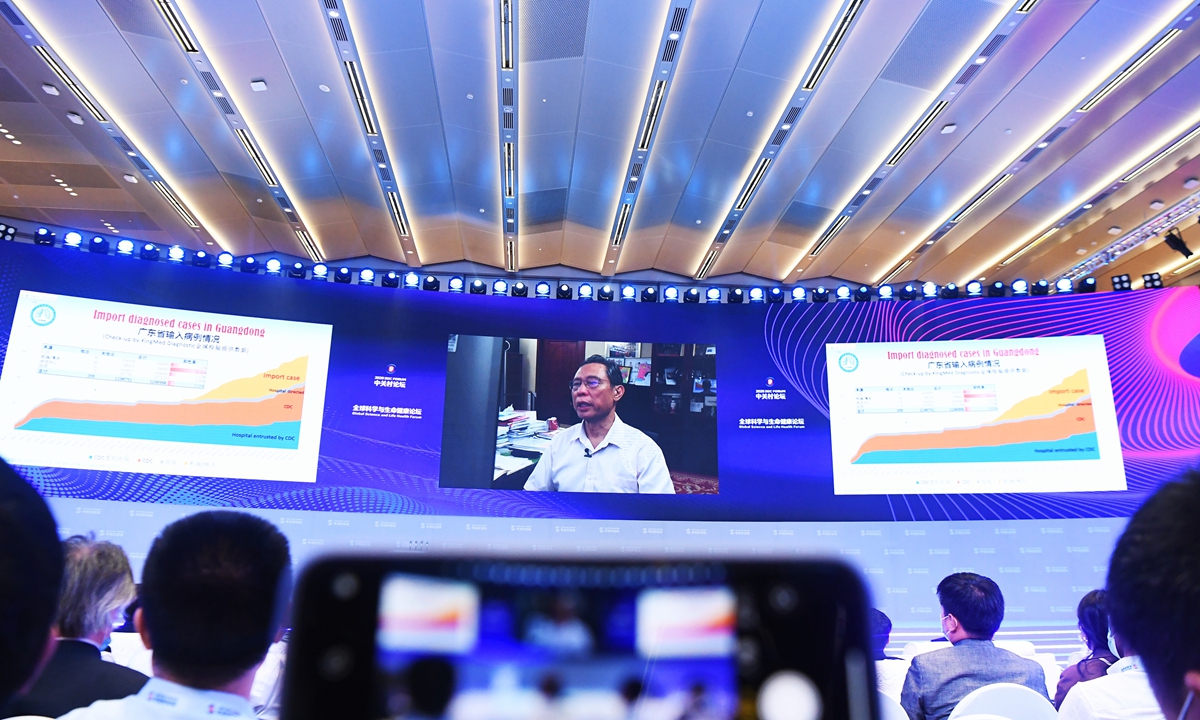China eyes epidemic prevention next year with vaccines, research
By Wang Qi Source: Global Times Published: 2020/9/18 21:48:40

Zhong Nanshan, China's renowned respiratory disease expert, speaks on COVID-19 prevention at the 2020 Zhongguancun Forum in Beijing on Friday. Photo: VCG
Uncertainties about the coronavirus have driven China to speed up research and development of vaccines, while still adopting previous experiences in prevention and control in winter and next year.
China has established a national novel coronavirus center to collect the virus, perform genome sequencing and training, conduct COVID-19-related international cooperation and develop national standards, Gao Fu, head of Chinese Center for Disease Control and Prevention, said on Friday.
The world is still in the early stages of the pandemic, Gao said at the Beijing-based 2020 Zhongguancun Forum, which included China's most senior epidemic experts, stressing that COVID-19 outbreaks have already adapted to humans.
Shi Zhengli, director of the Wuhan Institute of Virology, said that the intermediate host and transmission path of the virus from nature to humans remain unknown, and may never be answered, which makes COVID-19 almost untraceable.
Although China reported zero domestically-transmitted cases in the Chinese mainland in a month, and China's experiences have proven successful, observers remain concerned about uncertainties, which come from limited knowledge about the virus, which is still spreading around the world, and also the risk of imported infections.
Zhong Nanshan, China's renowned respiratory disease expert, said that the COVID-19 pandemic will very likely to continue to spread in winter and spring. And if another domestic outbreak emerges, China will continue to take joint prevention and control measures at the community level, wide-ranging nucleic acid screening, tracing close contacts and isolating asymptomatic patients with positive nucleic acid results.
COVID-19 patients are most infectious five days before and after showing symptoms, with high fatality rates in severely ill patients, Zhong said, adding that in the absence of any intervention, COVID-19 would likely affect 60-70 percent of the global population, with a mortality of close to seven percent.
Herd immunity should be achieved through mass vaccination, which will take about one to two years and require global cooperation, Zhong said.
Another attendee of the forum, China's top vaccine researcher Chen Wei, stressed that vaccines are one of the most powerful scientific and technological weapons in curbing the pandemic.
Chen, who is confident about the safety and effectiveness of China's vaccine, said that current coronavirus mutations have little impact on vaccine research and development. And China is about to launch a larger clinical trial of a vaccine for people over 55 years old.
The Chinese Minister of Science and Technology revealed on Friday that 11 China-developed COVID-19 vaccines have entered clinical trials, with four of them in Phase III. Chen noted that there are 182 COVID-19 vaccine candidates, of which 36 are in clinical trials, and nine in phase III clinical trials.
More than 100,000 people in China have been vaccinated without showing any reactions, media reported earlier.
Tao Lina, a Shanghai-based vaccine expert, told the Global Times on Friday that if more than 70 percent of Chinese people are vaccinated, reaching 90 percent effectiveness by 2021, current anti-epidemic measures will be updated to become more flexible and at a lower cost.
Much remains unknown about the virus, so it is not realistic to expect it to disappear after people develop herd immunity. Protection with the vaccine is particularly important, and that is the direction of scientists, Tao said.
In the absence of vaccines, China has set an example in traditional epidemic prevention, and China can also set an example for the world through vaccine-driven herd immunity, Tao said.
RELATED ARTICLES:
Posted in: SOCIETY